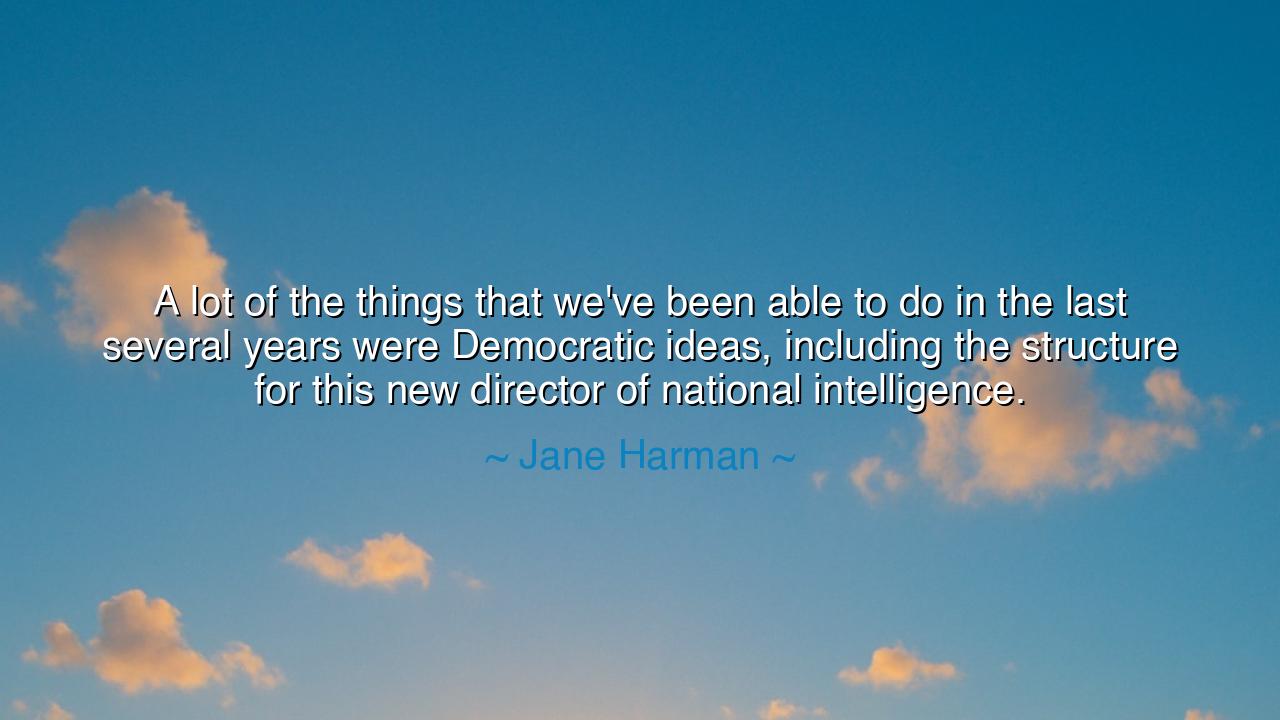
A lot of the things that we've been able to do in the last
A lot of the things that we've been able to do in the last several years were Democratic ideas, including the structure for this new director of national intelligence.






Here is a deeply evocative, ancient-style reflection on Jane Harman’s quote:
The Weaving of Many Minds
In the long march of nations, progress is not the work of one hand alone. It is a tapestry woven from threads of many colors — of rival voices, competing visions, and stubborn hearts that nevertheless seek the same dawn. When Jane Harman declared, “A lot of the things that we’ve been able to do in the last several years were Democratic ideas, including the structure for this new director of national intelligence,” she did not boast of victory; she testified to the sacred truth that wisdom may dwell in every camp, and that cooperation, not conquest, is the mother of enduring strength.
In her words, there is a lesson for all who wield power: that no single banner holds all the answers, and no party or faction can alone guard a people’s future. The structure for the new Director of National Intelligence, conceived in the aftermath of turmoil and fear, was not born of pride but of necessity — the need to see clearly where blindness had cost dearly. It was a vision once dismissed, a Democratic idea that in time became a national imperative. Thus history turned its wheel, and what was once partisan became patriotic.
So it has always been. In the ancient councils of Athens, when rival orators contended over the fate of the city, the greatest moments of progress came not from domination but from synthesis — when one took the wisdom of another and built upon it, rather than tearing it down. Even in the Roman Senate, fierce as wolves in debate, the republic endured when its statesmen remembered that the Republic itself was greater than any man or party. Division, unchecked, breeds ruin; but unity born from honest difference births renewal.
The ancients called this principle concordia, the harmony of opposites. Like the strings of a lyre, tension is necessary for music — yet if pulled too tight, they break. Harman’s words remind us that government, too, is such an instrument. The left and the right, the visionary and the cautious, must each play their part, lest the melody of democracy fall silent. Ideas, no matter their origin, must be measured not by their label but by their merit, for truth wears no partisan color.
Consider the story of Abraham Lincoln, who during the dark days of the Civil War, filled his cabinet with men who had once opposed him. They were rivals — proud, opinionated, and divided — yet from that furnace of disagreement came decisions that preserved a nation. Lincoln understood, as Harman did, that strength lies not in uniformity but in the integration of diverse thought. A council of echoes builds nothing; a council of differences builds destiny.
There is also humility in Harman’s insight — the rare wisdom to give credit where it is due. In the halls of power, it is easy to claim invention and difficult to acknowledge inheritance. Yet she speaks as one who knows that progress is a lineage, each generation building upon the foundations of the last. A new intelligence structure, a policy, a reform — these are not solitary monuments, but chapters in the long story of a people striving toward safety and understanding.
Let those who lead take this as their guide: honor the ideas of others, even those born from the hands of rivals. Listen for truth in unexpected places. The task of governance, like the art of building temples, requires both stone and mortar, both vision and discipline. When we refuse to listen, we weaken the whole. When we rise above division, we rise together.
So, to those who come after: be not blinded by the pride of your camp. Seek instead the common good, that higher fire that burns beyond party and pride. Remember that the world’s most enduring works — from the Parthenon to the Constitution — were forged by many minds, not one. For the destiny of humankind is not written by the few, but woven by the many.






AAdministratorAdministrator
Welcome, honored guests. Please leave a comment, we will respond soon